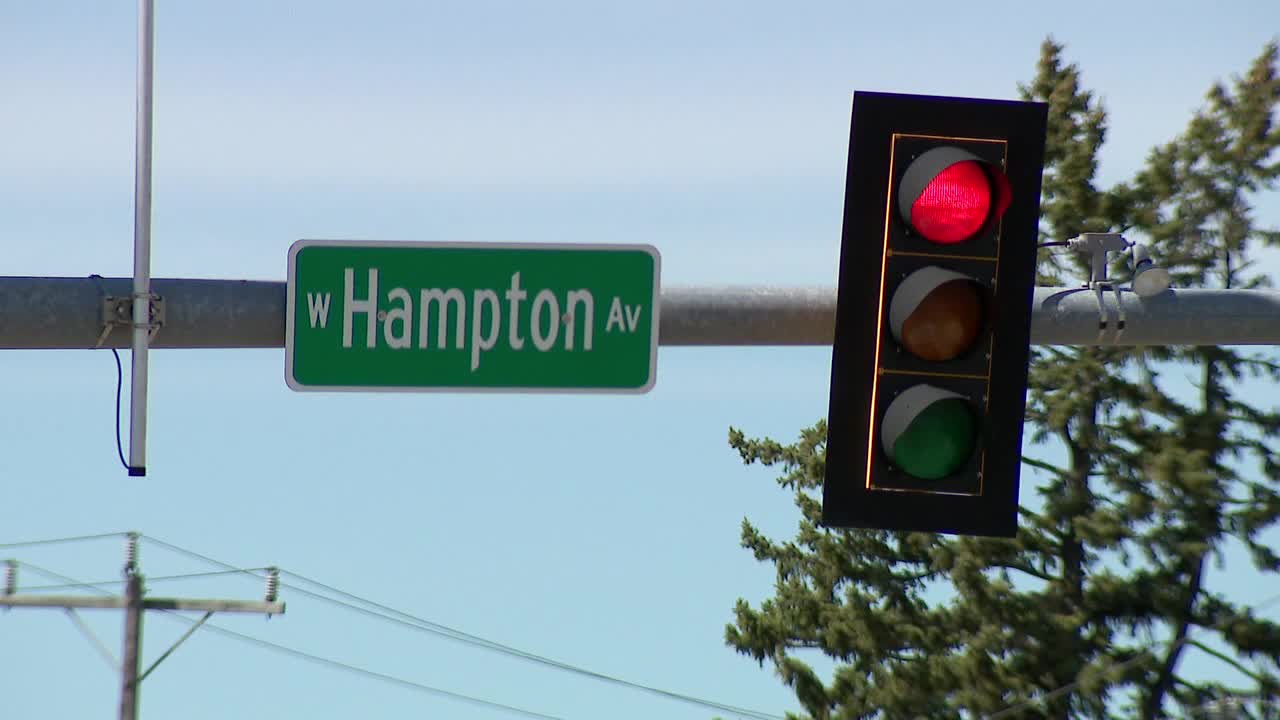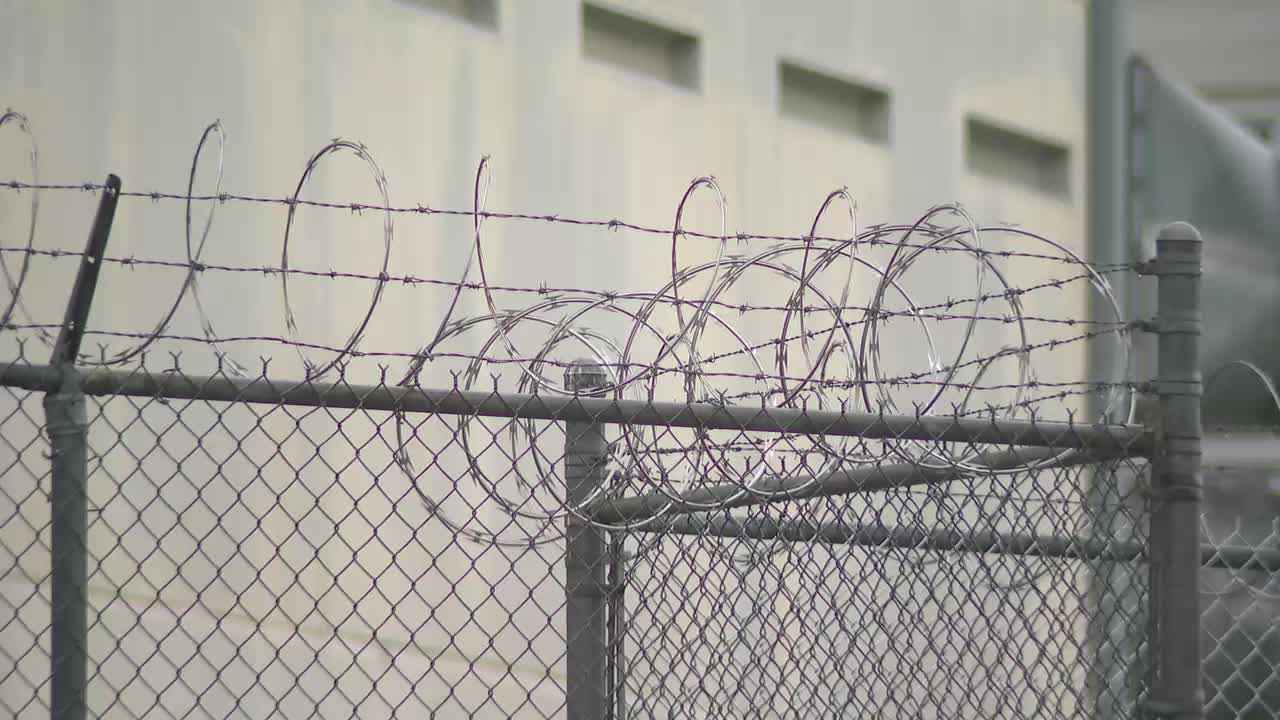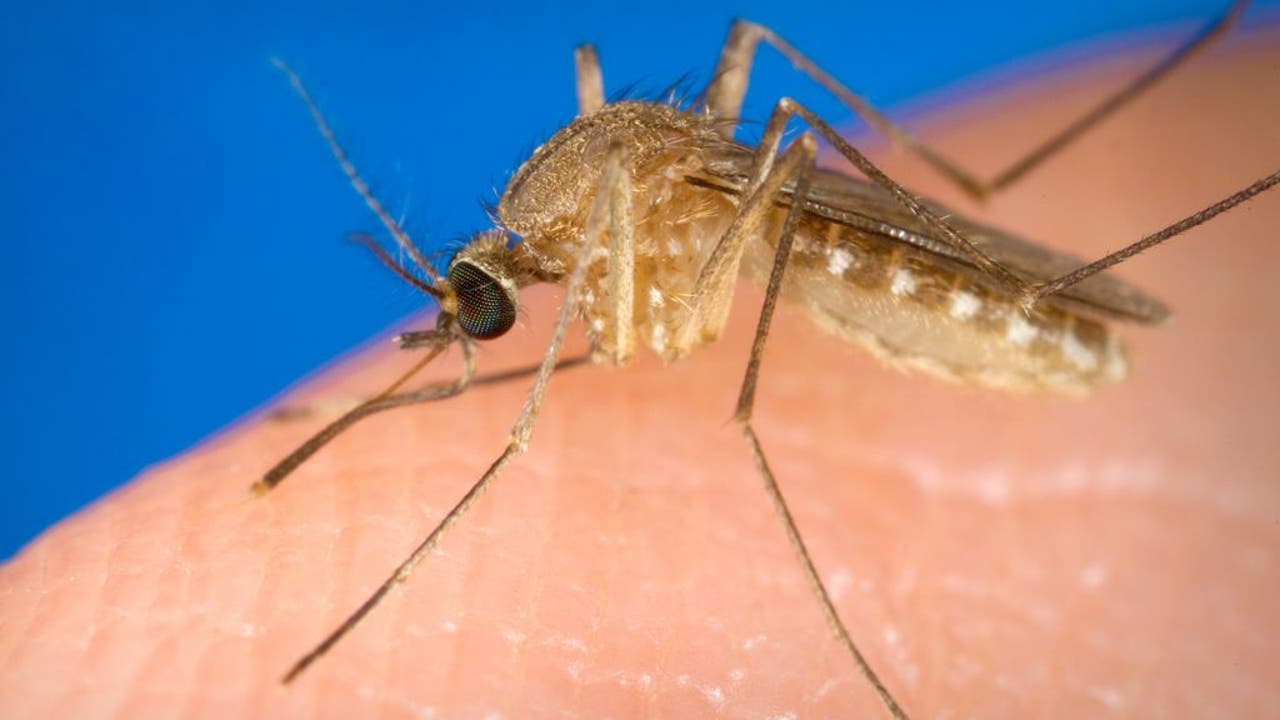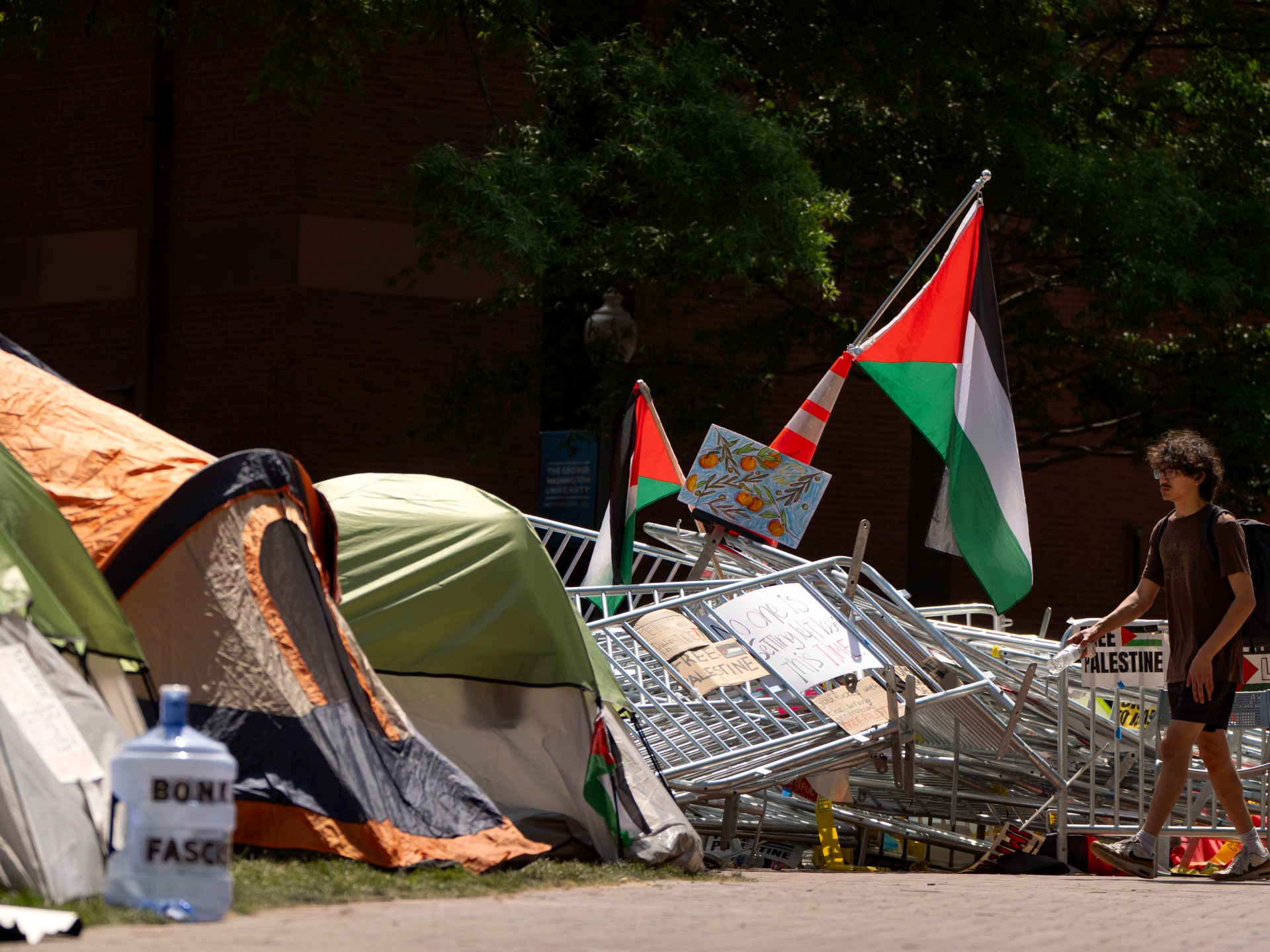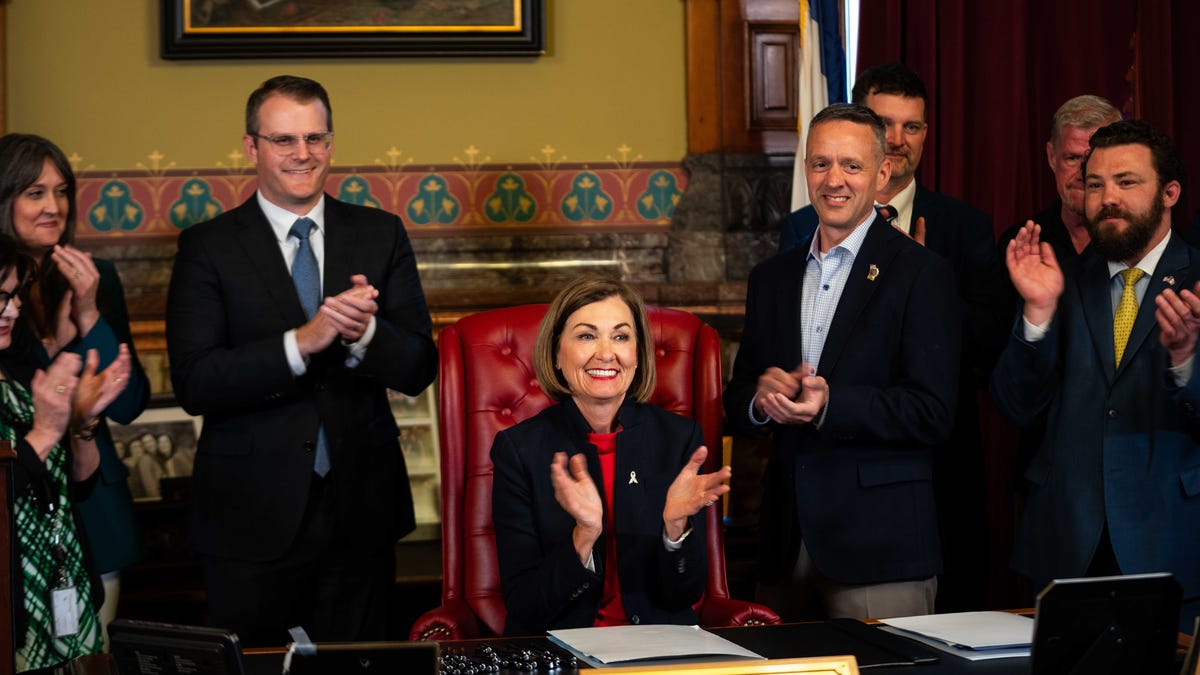World
Ron DeSantis drops out of US presidential race, endorses Trump
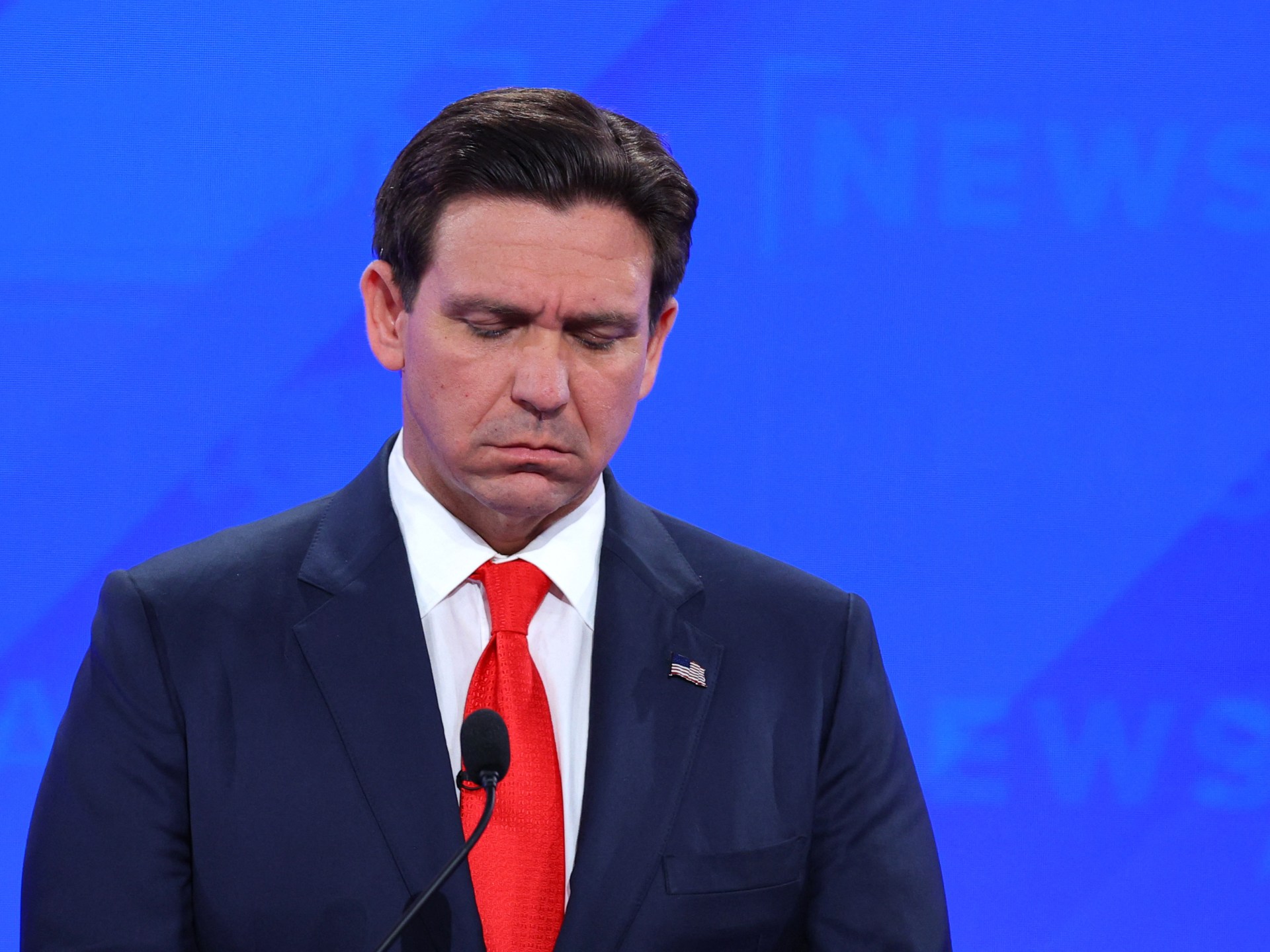
Florida Governor Ron DeSantis has suspended his Republican US presidential campaign just before the New Hampshire primary and endorsed Donald Trump, ending a White House bid that failed to meet expectations that he would emerge as a serious challenger to the former president.
“It’s clear to me that a majority of Republican primary voters want to give Donald Trump another chance,” he said in a video posted on X on Sunday.
New Hampshire’s primary, the first in the United States, comes on Tuesday.
DeSantis derided former UN Ambassador Nikki Haley, long his closest rival for second place in the primary race, saying Republicans “can’t go back to the old Republican guard of yesteryear, a repackaged form of warmed-over corporatism that Nikki Haley represents.”
DeSantis entered the 2024 presidential contest with major advantages in his quest to take on Trump, and early primary polls suggested he was in a strong position to do just that.
He and his allies amassed a political fortune well in excess of $100m and he boasted a significant legislative record on issues important to many conservatives like abortion and the teaching of race and gender issues in schools.
Such advantages did not survive the reality of presidential politics in 2024.
From a high-profile announcement that was plagued by technical glitches to constant upheavals to his staff and campaign strategy, DeSantis struggled to find his footing in the primary. He lost the Iowa caucuses – which he had vowed to win – by 30 percentage points to Trump.
And now, DeSantis’s political future is in question after he suspended his presidential bid following just one voting contest. The 45-year-old is term-limited as Florida’s governor.
DeSantis was widely expected to be a serious challenger to Trump.
Acknowledging the threat, Trump went after the Florida governor viciously in the months leading up to DeSantis’s announcement of his candidacy in May, and continued to pound him on the campaign trail, on social media and in paid advertising in the months that followed.
Yet many of DeSantis’s problems may have been his own doing.
Fuelled by his dominant Florida re-election in 2022, DeSantis sidestepped tradition by announcing his presidential campaign on X, in a conversation on the social media site with CEO Elon Musk. The site failed repeatedly during the conversation, making it all but impossible to hear his opening remarks as a presidential candidate.
In the subsequent weeks and months, DeSantis struggled to connect with voters on a personal level.
He irked some New Hampshire Republican officials in his campaign’s inaugural visit to the state by declining to take questions from voters, as is tradition in New Hampshire. And later, uncomfortable interactions with voters in other states were caught on camera as well.
More serious financial challenges emerged over the summer.
By the end of July, DeSantis had laid off nearly 40 employees in a move designed to cut roughly one-third of his campaign payroll. The cuts came shortly after public filings revealed that he was burning through his substantial campaign coffers at an unsustainable rate.
Some people looking for a Trump alternative backed Haley, the former diplomat and South Carolina governor who gained popularity among many Republican donors, independent voters and the so-called Never Trump crowd.
DeSantis and Haley frequently attacked each other in debates and in advertising, often more directly than they went after Trump.
As internal financial concerns mounted, DeSantis turned aggressively to an allied super PAC to handle basic campaign functions such as organising campaign events, advertising and an expansive door-knocking operation.
Federal law does not allow campaigns to coordinate directly with super PACs.
In December, a non-partisan government watchdog group filed a complaint with the Federal Election Commission, citing reporting by The Associated Press and others, alleging that the degree of coordination and communication between DeSantis’s campaign and the Never Back Down super PAC crossed a legal line.
DeSantis denied any wrongdoing and called the complaint “a farce”.
Still, the steady stream of negative developments leading up to the opening primary contests undermined the confidence of DeSantis’s donor network, which was supposed to be a major strength, and would-be supporters at the ballot box. As his polling numbers stagnated, DeSantis and his allies pulled back on their multistate strategy and focused virtually all of his resources on Iowa’s opening caucuses.
After leaving the 2024 presidential contest, DeSantis now refocuses his attention on the rest of his second and final term as Florida’s governor, which ends in January 2027.

World
New Russia sanctions target weapons development and countries assisting in sanctions evasion
WASHINGTON (AP) — The U.S. on Wednesday imposed new sanctions on hundreds of firms and people tied to Russia’s weapons development program, more than a dozen Chinese firms accused of helping Russia find workarounds to sanctions and individuals tied to the death of Russian dissident Alexey Navalny.
The sanctions imposed by the Treasury and State departments target Russia’s military-industrial base, chemical weapons programs and people and firms in third countries that help Russia acquire weapons components as its invasion of Ukraine has entered its third year.
Treasury Secretary Janet Yellen said the action “will further disrupt and degrade Russia’s war efforts by going after its military industrial base and the evasion networks that help supply it.”
The sanctions come as the Senate gave final approval to legislation barring imports of Russian uranium, boosting U.S. efforts to disrupt Russia’s war in Ukraine. President Joe Biden is expected to sign the bill into law.
About 12% of the uranium used to produce electricity at U.S. nuclear power plants is imported from Russia, according to the U.S. Energy Information Administration.
A spokesperson for the National Security Council said Wednesday that Biden, a Democrat, shares lawmakers’ concerns about U.S. reliance on Russia for low-enriched uranium to support its domestic nuclear fleet.
Included in Wednesday’s sanctions announcement are importers of cotton cellulose and nitrocellulose — used to produce gunpowder, rocket propellants and other explosives. Also included are Russian government entities and people tied to Russia’s chemical and biological weapons programs and firms related to Russia’s natural gas construction projects.
Russian President Vladimir Putin has repeatedly railed against several rounds of U.S. and Western sanctions, claiming last year that they are “illegitimate sanctions” on his country.
A group of 16 targets in China and Hong Kong, most of which are related to Russian procurement workarounds, are also included in the latest sanctions announcement.
Firms in countries including China, Azerbaijan, Belgium, Slovakia, Turkey and the United Arab Emirates are accused of helping Russia acquire technology and equipment from abroad. The penalties aim to block them from using the U.S. financial system and bar American citizens from dealing with them.
The sanctions come after Biden last week said he would immediately rush badly needed weaponry to Ukraine as he signed into law a $95 billion war aid measure that also included assistance for Israel, Taiwan and other global hot spots.
Yellen said with the sanctions and supplemental funding combined, “our support for Ukraine and our relentless targeting of Russia’s military capacity is giving Ukraine a critical leg-up on the battlefield.”
World
Indonesia’s Ruang volcano spits more hot ash after eruption forces schools and airports to close
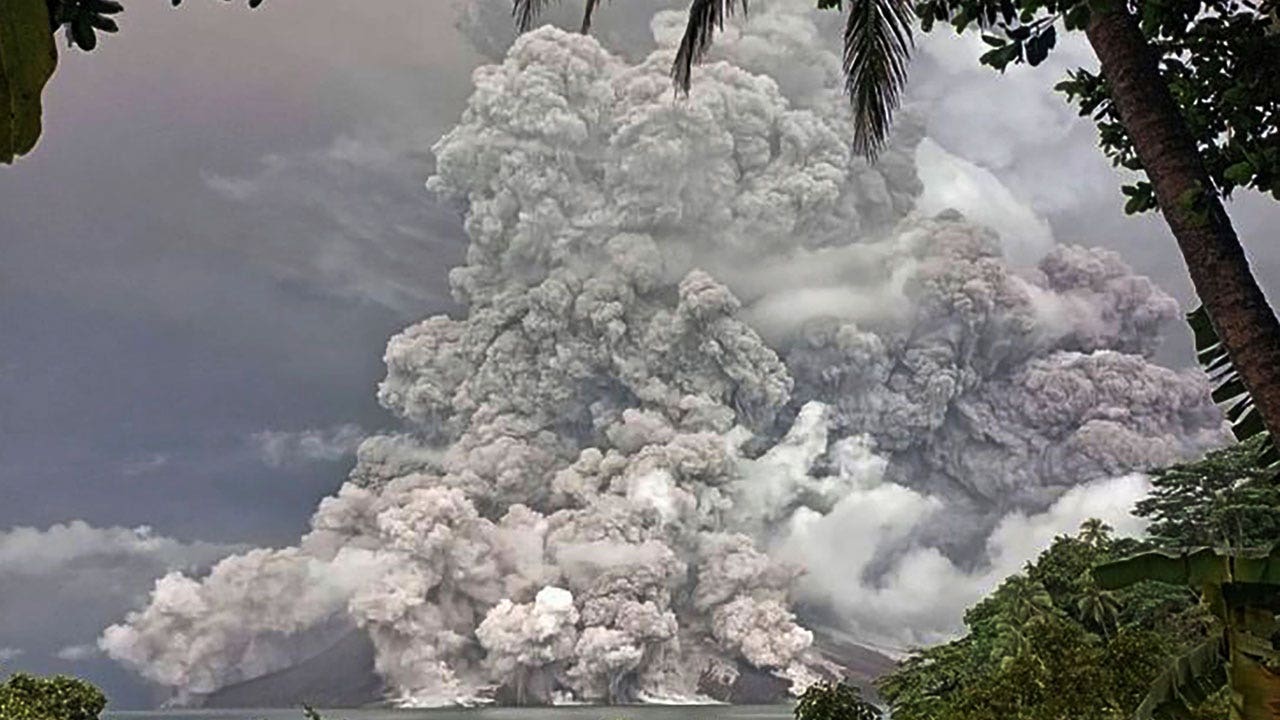
Indonesia’s Mount Ruang volcano spewed more hot clouds on Wednesday after an eruption the previous day forced the closure of schools and airports, pelted villages with volcanic debris and prompted hundreds of people to flee.
Seven airports, including Sam Ratulangi international airport in Manado, the capital of North Sulawesi province, remained closed after Tuesday’s eruption, the second in two weeks. Schools were shut to protect children from volcanic ash.
The volcano is on tiny Ruang Island, part of the Sitaro islands chain.
VIDEO SHOWS LIGHTNING SHOOTING FROM TOXIC ASH CLOUD DURING POWERFUL VOLCANIC ERUPTION IN INDONESIA
The Indonesian geological agency urged people to stay at least 4 miles from the volcano’s crater. It warned people on nearby Tagulandang Island, the closest to the volcano, of possible super-heated volcanic clouds from a further eruption and a tsunami if the mountain’s volcanic dome collapses into the sea.
Mount Ruang releases volcanic materials during its eruption on April 30, 2024, on Sulawesi Island, Indonesia. The volcano erupted on April 30 for a second time in two weeks, spewing ash more than a mile into the sky, forcing an airport to close and peppering nearby villages with debris. (Vulcanology and Geological Disaster Mitigation Center via AP Photo)
Video released by the National Search and Rescue Agency showed about a hundred villagers from Tagulandang Island being evacuated on a navy ship. Hundreds of others were waiting at a local port to be evacuated.
Agency spokesperson Abdul Muhari said 11,000 to 12,000 people living within a 4-mile danger zone would be taken to government shelters.
Tuesday’s eruption darkened the sky and peppered several villages with ash, grit and rocks. No casualties were reported.
After Mount Ruang’s April 17 eruption, authorities warned that a subsequent eruption might collapse part of the volcano into the sea.
Ruang is among about 130 active volcanoes in Indonesia. The archipelagic nation is prone to volcanic eruptions and earthquakes because of its location on the Pacific “Ring of Fire,” a series of fault lines stretching from the western coast of the Americas through Japan and Southeast Asia.
World
Turkish police arrest hundreds at Istanbul May Day protests

Authorities deployed more than 40,000 police officers across the city after banning protests in Taksim Square.
Police in Istanbul have used tear gas and rubber bullets to disperse protesters who tried to break through a barricade to reach the city’s Taksim Square in defiance of a ban on May Day rallies.
Turkish Interior Minister Ali Yerlikaya said 210 people were arrested on Wednesday.
More than 40,000 police were deployed across the city, blocking even small side streets with metal barriers after President Recep Tayyip Erdogan said on the eve of May Day that the annual protests would not be allowed to take place in the square.
Tall metal barriers were put up around the square – a traditional focal point of protests in Istanbul, where authorities have banned rallies since 2013, when it was the focus of demonstrations against Erdogan’s government.
On X, Yerlik said that “210 people were detained in Istanbul after failure to heed our warnings and attempting to walk to the Taksim Square and attack our police officers on May 1 Labour and Solidarity Day.”
Police clashed with demonstrators near city hall in the Sarachane district, firing tear gas and rubber bullets to stop protesters from breaching barricades, the AFP news agency reported.
“We have demonstrated our will to celebrate May Day at Taksim Square. We have legal grounds,” Arzu Cerkezoglu, secretary general of the Confederation of Revolutionary Trade Unions of Turkey (DISK), told AFP.
“Taksim is an important symbol for us. Taksim means May Day, Taksim means labour,” she said.
In 2023, Turkey’s top constitutional court ruled that the closure of Taksim Square for protests was a violation of citizens’ rights. The square was a rallying ground for May Day celebrations until 1977, when at least 34 people were killed during demonstrations. Authorities opened it up again in 2010, but it was shut again after the 2013 protests.
City locked down
Main roads across Istanbul were closed to traffic while public transport including ferries and subway trains was halted because of the security clampdown. Landmarks such as the Topkapi Palace were cordoned off.
On Monday, Yerlikaya said Taksim would be out of bounds for rallies to stop “terrorist organisations” from using it for “propaganda”.
Turkey’s main opposition Republican People’s Party (CHP) and unions had pressed the government to open the square for labour rallies, but Erdogan warned on Tuesday against any provocation.
CHP leader Ozgur Ozel, accompanied by Istanbul’s Mayor Ekrem Imamoglu and labour unions, gathered in the Sarachane neighbourhood.
“We will keep on fighting until Taksim is free,” Ozel said. “Taksim belongs to the workers.”
Addressing the police, Ozel declared: “These workers are not your enemies. Our only desire is for the day to be celebrated as a festival. We do not want conflict.”
-

 Education1 week ago
Education1 week agoVideo: Dozens of Yale Students Arrested as Campus Protests Spread
-

 World6 days ago
World6 days agoHaiti Prime Minister Ariel Henry resigns, transitional council takes power
-

 News7 days ago
News7 days agoLarry Webb’s deathbed confession solves 2000 cold case murder of Susan and Natasha Carter, 10, whose remains were found hours after he died
-

 Politics1 week ago
Politics1 week agoFetterman hammers 'a–hole' anti-Israel protesters, slams own party for response to Iranian attack: 'Crazy'
-

 World1 week ago
World1 week agoPeriod poverty still a problem within the EU despite tax breaks
-

 World7 days ago
World7 days agoUS secretly sent long-range ATACMS weapons to Ukraine
-

 News6 days ago
News6 days agoFirst cargo ship passes through new channel since Baltimore bridge collapse
-

 World1 week ago
World1 week agoTurkey’s Erdogan meets Iraq PM for talks on water, security and trade

